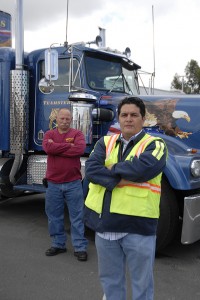 Yesterday’s direct action at the West Coast ports, though it failed to completely shut down shipping as was hoped, did cause significant disruption to business in many locations from San Diego to Anchorage. The protestors were able to cause a major marine terminal (Portland) to close. They brought things to a standstill for a time in Oakland and in Longview, Washington. They slowed business in Long Beach, in Seattle and elsewhere.
Yesterday’s direct action at the West Coast ports, though it failed to completely shut down shipping as was hoped, did cause significant disruption to business in many locations from San Diego to Anchorage. The protestors were able to cause a major marine terminal (Portland) to close. They brought things to a standstill for a time in Oakland and in Longview, Washington. They slowed business in Long Beach, in Seattle and elsewhere.
Much of the media coverage of this action has centered on how the protests were viewed by organized labor, and on the broader issue of the relationship between the Occupy Wall Street movement and the unions. Some reports even played-up rifts between the protestors and workers. Mid-morning yesterday, a story from CBS News showed up in my aggregator with this summary. “Anti-Wall Street activists plan blockades to support dockworkers’ labor struggle, but union doesn’t want their help.”
Later in the day a lot of OWS supporters were linking to this post from CleanAndSafePorts.org that’s titled An Open Letter from America’s Port Truck Drivers on Occupy the Ports. It’s signed by drivers of many years standing who were elected to speak on behalf of local committees from Long Beach, Seattle & Tacoma, Los Angeles, Oakland and New York & New Jersey. It presents a fairly nuanced description of their issues and their feelings about the OWS Action. Here’s an excerpt.
We are inspired that a non-violent democratic movement that insists on basic economic fairness is capturing the hearts and minds of so many working people. Thank you “99 Percenters” for hearing our call for justice. We are humbled and overwhelmed by recent attention. Normally we are invisible.
I would encourage you to read the entire letter to learn more about these workers’ lives and the difficulties that they face each day, as well as their (somewhat ambivalent) feelings about the direct action yesterday.
In parts of the country, there have been rather rocky relations between some organized labor groups and the OWS protestors from the very beginning. One need only read a few of the local General Assembly minutes to notice that. Some union leaders seemed suspicious (and perhaps even a little jealous) of a “Johnny come lately” grassroots populist movement shouting about issues of economic injustice around which Labor has been organizing for more than a century. By the same turn, many folks in the Occupy movement seemed suspicious of any of the big institutions of our society, labor unions included. Though there have been many instances of mutual support for causes and actions, it sometimes remains an uneasy alliance.
The sound bites and the headlines miss a lot of the underlying issues – structural, legal and ideological – that have set the stage for the interaction between OWS and the unions. Some of those issues have as much to do with the history of the Labor Movement in the United States as they do with any unique current conditions.
I would highly recommend an article from Richard Myers over on Daily Kos titled Unions, OWS, and Blocking The Ports. He observes that “the union roots of OWS are much broader and deeper than most observers realize.” He particularly notes the similarity in philosophy and tactics shared by OWS and the Industrial Workers of the World (horizontal democratic structure, emphasis on direct action, etc.).
As Richard notes, part of what may be playing out here is the tension between an increasingly radical local rank and file, and the stodgy reactionism of their national union leaders. He concludes, “There is no reason in the world to turn against OWS on the false basis that OWS doesn’t respect workers’ rights. OWS is all about workers’ rights. The really big question is: how far will national leaders of business unions go for the workers?”
It seems to me that he hits the nail directly on the head.
###
Read Richard Myers’ article at Daily Kos.
Learn more about the West Coast ports direct action.
Find out about the IWW.